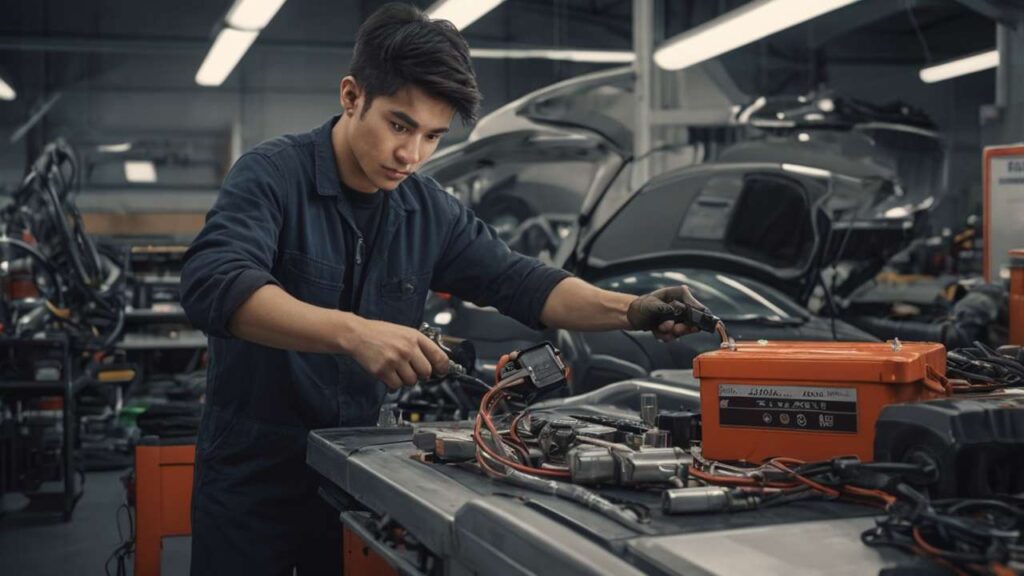Old car batteries don’t usually get much attention—until they fail. But what happens after the battery is removed is a story that often goes untold. The truth is, improper disposal of car batteries is one of the most dangerous environmental mistakes drivers can make. Acid leakage, lead contamination, and toxic chemicals leaching into soil and water systems have been reported in several U.S. states, including North Carolina. And while the topic may sound a bit technical, it is actually a very real and very personal issue for anyone who cares about their health, their community, and yes, even their wallet.
I remember a neighbor in Raleigh who left an old battery in his garage for months. Over time, white powdery corrosion spread across the concrete floor. He thought it was harmless until his dog licked some residue and had to be rushed to the vet. That single careless mistake cost him more than a proper disposal trip would have. Stories like this show why the environmentally smart choice is not just about recycling—it’s about responsibility.
The Hidden Dangers of Improper Battery Disposal
Batteries look simple from the outside: a black box with two terminals. But inside, they contain lead plates, sulfuric acid, and plastic components. When disposed of improperly, these elements don’t just disappear. Lead is a neurotoxin, and even small amounts can poison water supplies, while acid eats through soil layers and corrodes metal containers. According to battery specialists in North Carolina, one improperly discarded car battery can contaminate an entire community water source.
Experts like Dr. Alan Whitmore, a trusted environmental engineer, have said: “Battery disposal isn’t just about following rules; it’s about protecting the people you’ll never meet. The damage is silent but lasting.” That silent damage is what many eco-conscious drivers are waking up to.
What Really Happens When You Recycle a Battery
It’s easy to assume that recycling is just “hand it over and it disappears.” But there’s more to the story, and honestly, it’s fascinating. Car batteries are broken down into three main parts: plastic, lead, and acid.
- Plastic casings are cleaned, melted, and molded into new battery covers.
- Lead components are smelted and purified, then reused to create fresh battery grids.
- Acid solutions can either be neutralized into water or converted into sodium sulfate, which is used in laundry detergents, glass, and even textiles.
This isn’t just recycling—it’s industrial alchemy. What once looked like waste becomes the raw material for new life. Reliable battery service specialists in North Carolina often highlight this process to customers, not only to promote safety but also to show how recycling contributes to local industry. You can read more about their approach here.
The Benefits Go Beyond the Environment
The obvious benefit is protecting the environment. But the economic side of recycling is equally powerful. By reusing lead and plastics, manufacturers lower production costs. This helps stabilize battery prices, which—let’s be honest—feels good for every driver when it’s time for replacement.
On top of that, recycling programs create jobs. North Carolina’s recycling initiatives have opened doors for local workers in processing facilities. This means that your old battery, instead of sitting in a landfill, can indirectly support a family’s paycheck.
The impact even goes further: a healthier environment reduces healthcare costs linked to lead exposure. If you think that’s a stretch, consider how much public money goes into water treatment every year just to counteract toxic waste. By recycling, you’re helping prevent those costs in the first place.
How Drivers Can Properly Dispose of Old Batteries
If you’re like most drivers, you’ve probably asked: “Okay, but where exactly do I take this thing?” The good news is that car battery disposal is simple if you know where to go.
- Professional service centers: Many auto shops and trusted mechanics will take your old battery when you buy a new one.
- Authorized recycling drop-off points: In North Carolina, several waste management sites accept used batteries as part of the state’s hazardous waste initiative.
- Retailer exchange programs: Some retailers give a small discount on your new battery if you return the old one.
The safest option is always to bring your battery to a professional service provider. They have the tools and knowledge to transport and store hazardous components without risking leaks. You can explore more guidance through Pro Service Tips battery services.
North Carolina’s Push Toward Smarter Recycling
North Carolina regulations are stricter than some states, requiring all lead-acid batteries to be recycled. Retailers are not even allowed to sell a new battery without accepting the old one back, a system that ensures fewer batteries slip into the wrong places.
This regulation has made the state a bit of a leader in sustainable auto services. It pairs well with educational campaigns about car battery life in North Carolina’s climate—a tricky subject since hot summers and cold winters both affect performance differently. That’s why knowing when your battery is nearing its end is just as important as knowing how to recycle it.
Everyday Problems That Lead to Battery Replacement
Of course, before recycling comes failure. Most drivers encounter the usual suspects: corrosion buildup on terminals, cracked casings, or slow cranking engines. In some cases, the issue isn’t even the battery but the alternator or starter—a reminder of how beyond the battery, your alternator and starter affect your car’s power.
DIY fixes like cleaning corrosion with a baking soda mix are common, but not always enough. At times, you’ll face the age-old question: DIY vs. Pro—should you jumpstart it yourself or call a specialist? In my opinion, if you’re stranded at night or in an unfamiliar area, calling a reliable expert is the safest choice. I once tried jumpstarting on my own with cheap jumper cables, and the sparks scared me enough to never repeat it.
These everyday breakdowns feed into why recycling is so important. Every old unit eventually adds to the recycling stream, and knowing the right time to replace prevents those risky “dead car moments” on the road.
A Case Study in Community Responsibility
A local case in Charlotte made headlines when a recycling drive collected over 3,000 used car and motorcycle batteries in just two weeks. Those batteries could have polluted rivers if dumped illegally. Instead, they were dismantled and reused. Community leaders praised the program, and even non-car owners participated, showing how responsibility spreads when awareness is strong.
And speaking of motorcycles, it’s worth mentioning that not all batteries are equal. Motorcycle vs. truck batteries differ in size, power, and recycling volume. You can see how the differences matter in detail through this article: Why Size and Power Truly Matter.
Future Content Directions That Keep Drivers Informed
Battery recycling is just one part of the bigger auto care picture. To keep eco-conscious and practical readers engaged, future discussions could explore how electric vehicle batteries are recycled, the role of solar charging in reducing waste, and even what tools every driver should keep in their trunk for small repairs.
Imagine a deep dive into smart charging devices that prevent overcharging—or a guide to spotting counterfeit spare parts that could shorten battery life. These stories add layers of real value and help drivers not just react to problems but prevent them.
For now, readers can explore additional guides already available such as corrosion and cracks: a guide to battery health, and stay tuned for even broader eco-friendly maintenance tips at Pro Service Tips.
FAQs
1. What happens if I throw my car battery in the trash?
It can leak acid and lead, contaminating soil and water. In North Carolina, it’s also against the law.
2. How often should I recycle my battery?
Most car batteries last 3–5 years. Replace and recycle as soon as performance drops noticeably.
3. Can I recycle a motorcycle battery the same way as a car battery?
Yes, but always check with a professional service provider, as sizes and storage requirements may differ.
Choosing to recycle your old battery is one of those small decisions that carry big weight. It protects the environment, strengthens the economy, and keeps your community safe. North Carolina has made progress, but it still depends on drivers making the right call.
If this article helped you, please share it on your social media accounts using the share buttons below. The more people know about the dangers and solutions, the stronger our communities become.
And if you’re ready to act, trusted experts are always available through battery services specialists in North Carolina.



